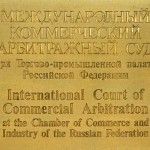TransTeleCom Dispute: When is a Side a Not a Party?
 This article follows up on an earlier publication dealing with the Vega Engineering v TransTeleCom case. In that dispute, TransTeleCom raised various grounds to challenge the arbitral award, which were all considered by the Russian Arbitrazh Court. One of the grounds – finality of the arbitral award – was discussed in the article mentioned above.
This article follows up on an earlier publication dealing with the Vega Engineering v TransTeleCom case. In that dispute, TransTeleCom raised various grounds to challenge the arbitral award, which were all considered by the Russian Arbitrazh Court. One of the grounds – finality of the arbitral award – was discussed in the article mentioned above.
online pharmacy http://miamihealth.com/images/jpg/azithromycin.html no prescription drugstore
Another ground raised by TransTeleCom was lack of jurisdiction of the arbitral tribunal.
The distinction between international and domestic arbitration may trigger the application of different national statutes and arbitration rules. Should the application of international arbitration rules to a domestic arbitration be considered a ground for annulment?
Decisions of the Moscow Arbitrazh Court
Two Russian companies (Vega Engineering and TransTeleCom) and a Chinese company entered into a tripartite international sales contract. The contract provided for international arbitration in accordance with the rules of the ICAC.
The dispute that arose out of this contract was solely between the two Russian companies. The Chinese company was never a party to the arbitration, and the arbitral award, rendered by the ICAC in 2012, had no impact on the Chinese party’s rights or obligations.
The respondent failed to satisfy the award and the claimant applied to the Moscow Arbitrazh Court for enforcement of the arbitral award. The respondent filed an application for annulment of the arbitral award on the basis that the ICAC lacked jurisdiction. The court rejected the application for annulment.
online pharmacy http://miamihealth.com/images/jpg/lexapro.html no prescription drugstore
International Arbitration Criteria
A distinction criterion may be formal, e.g. ‘a side to an arbitration agreement.’ This criterion is used in the UNCITRAL Model law, article 1, “An arbitration is international if the parties to an arbitration agreement have, at the time of the conclusion of that agreement, their places of business in different States.”
A criterion may also be material, e.g. ‘international trade.’ This criterion is used in the French Civil Procedure Code, article 1504, “An arbitration is international when international trade interests are at stake”.
It may happen that an arbitral tribunal rendered an arbitral award under the arbitration rules and statutory regulations applicable to international arbitration while the arbitration was in fact a domestic one. Are there any grounds for annulment of the award on the basis that the arbitral tribunal lacked jurisdiction?
Is the Arbitration International?
online pharmacy http://miamihealth.com/images/jpg/flexeril.html no prescription drugstore
The ICAC rules and the Russian Federal Law on commercial arbitration provide that an arbitral tribunal has jurisdiction to hear “[d]isputes arising out of contractual … relationships connected with foreign trade …where the place of business of at least one of the parties is located abroad.”
The Moscow Arbitrazh Court ruled that the parties in question are the sides to an arbitration agreement and not the sides to the arbitration proceedings. Thus, regardless of the fact that both parties to the arbitration proceedings were Russian companies, the court found it decisive that a Chinese company, located abroad, was one of the parties to the arbitration agreement.
The court concluded that (i) the arbitration was international, (ii) the Russian Federal Law on international arbitration and ICAC rules applied and (iii) the ICAC had jurisdiction over the dispute between the two Russian companies.
Swiss Model
Under Swiss law, article 176 PILA, arbitration is international “…if at least one of the parties at the time the arbitration agreement was concluded was neither domiciled nor habitually resident in Switzerland.”
Is the relevant party meant to be a side to the arbitration agreement or the side to the arbitration proceedings?
The Swiss Supreme Court decided that arbitration is international if among the “parties to the arbitration proceedings” there is at least one that at the time of entering the arbitration agreement had its domicile or habitual residence abroad (BGE 4P.54/2002).
Hence, were the facts of the Russian case discussed above to be interpreted through application of Swiss law, the result would be the opposite one. On the one hand a dispute arises out of an arbitration agreement between two Swiss parties and a foreign party. On the other hand an arbitration claim is filed by one Swiss party against another Swiss party. As a result, there is no claim against a foreign party to the arbitration agreement.
Under Swiss law, the arbitration will be a domestic one. This is because the relevant parties are the sides to the arbitration proceedings and not the sides to the arbitration agreement.
Presumably, if later a party domiciled abroad at the time of conclusion of the arbitration agreement joins the arbitration proceedings, the arbitration will become international.
By contrast, if foreign parties to an arbitration agreement migrate to Switzerland, any arbitration between such all Swiss parties will still be governed by Swiss Private International Law applicable to international arbitration.
ICAC vs Swiss Rules
The important difference between the Russian and the Swiss approach is that unlike the ICAC rules, the Swiss Rules of International Arbitration apply both to domestic and international arbitration within the meaning of Swiss law, if chosen by the parties.
Hence, the issue of jurisdiction of the arbitral tribunal formed under Swiss Rules would not arise in this context.
Ekaterina Butler
Ekaterina Butler is attorney with a Swiss law firm LALIVE. Her main areas of practice are international arbitration, international taxation and estate planning.











